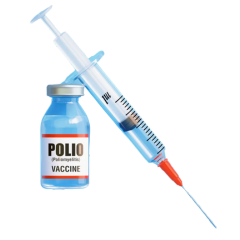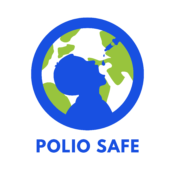
Polio Vaccine
Vaccination Guide
To ensure the highest level of protection against polio, it is critical to be vaccinated
Why Vaccinate?
Vaccinating children is crucial because:
Vaccination is the most effective way to prevent polio, a life-threatening and disabling disease. The polio vaccine helps protect individuals from the poliovirus, which can cause irreversible paralysis, and in some cases, can be fatal. Polio remains a global health concern, especially in certain regions where vaccination rates are low.
- Prevents Disability and Death: Polio can cause severe physical disabilities and even death, especially in young children. The vaccine eliminates these risks by preventing infection.
- Global Eradication Efforts: By vaccinating, you contribute to the worldwide effort to eradicate polio. The more children who are vaccinated, the closer we get to a polio-free world.
- Community Protection: Vaccination protects not only individuals but also the wider community. High vaccination rates contribute to herd immunity, making it harder for the virus to spread.
- Cost-Effective: Preventing polio through vaccination is much more cost-effective than treating the long-term consequences of the disease, which can burden families and healthcare systems.
Vaccine Schedule
The polio vaccination schedule is designed to provide maximum protection for children. Below is the recommended vaccination timeline based on the type of vaccine used:
Oral Polio Vaccine (OPV) and Inactivated Polio Vaccine (IPV) are both used globally, with many countries administering IPV through injections while OPV is given as drops.
- At Birth:
OPV: First dose (if available and recommended by local health authorities)
IPV: First dose (if included in the national immunization schedule)
- 2 Months:
IPV: Second dose (along with other routine vaccines)
- 4 Months:
IPV: Third dose (along with other routine vaccines)
- 6-18 Months:
IPV: Fourth dose (boosters may be given based on local vaccination schedules)
- 4-6 Years (Pre-School Age):
IPV: Fifth (booster) dose for additional protection
Note:
The vaccination schedule may vary slightly depending on the country and local health recommendations. Always consult with a healthcare provider to ensure the correct immunization schedule is followed.
Catch-Up Vaccination
For children who missed their scheduled vaccinations, catch-up immunization is available. These are additional vaccine doses given to children who are behind on their regular immunization schedule.
Frequently Asked Questions about the polio vaccine
FAQ's
The polio vaccine is designed to protect against poliovirus infection. It works by stimulating the immune system to produce antibodies that can fight off the virus if the person is exposed. There are two types of polio vaccines: OPV (Oral Polio Vaccine), which is given as drops, and IPV (Inactivated Polio Vaccine), which is given as an injection.
Yes, the polio vaccine is safe and has been rigorously tested. It has been used for decades to protect millions of children worldwide and is one of the most effective vaccines in history. Side effects are generally rare and mild, such as swelling at the injection site or a mild fever.
While polio is primarily a disease of children, adults who are traveling to countries where polio is still present should consider getting vaccinated. Additionally, adults who have not been previously vaccinated or who are unsure of their vaccination status may need a dose.
Booster shots are recommended for children at pre-school age (around 4-6 years) to ensure long-lasting immunity. Some countries may also recommend boosters for adults, especially those traveling to polio-endemic areas or working in healthcare settings.
If your child misses a polio vaccine dose, it’s important to catch up as soon as possible. Contact your healthcare provider to schedule the missed vaccine. Catch-up vaccinations are safe and provide the necessary protection.
Yes, some countries require proof of polio vaccination for travelers, especially if they are visiting polio-endemic areas. It’s important to check with health authorities or your travel clinic to ensure you meet the vaccination requirements for your destination.
To ensure your child is fully vaccinated, follow the immunization schedule provided by your country’s health department. Keep track of your child’s vaccinations and consult with your healthcare provider regularly to stay on track.
No, the polio vaccine cannot cause polio. The vaccine contains either killed virus (IPV) or weakened virus (OPV), neither of which can cause the disease. The vaccine helps your body fight the real virus if exposed.
While the vaccine is highly effective, no vaccine offers 100% protection. However, if a vaccinated child does contract polio, the symptoms are generally much milder, and the risk of severe complications is significantly reduced. Vaccination still provides the best defense against the disease.
Polio vaccines are available through local health clinics, hospitals, and vaccination centers. You can also check with your doctor or healthcare provider for the nearest vaccination facility. Vaccination is often provided free or at low cost in many countries.
The polio vaccine is very safe. The most common side effects are mild, such as redness or swelling at the injection site or slight fever. Serious side effects are extremely rare.
facts & Myths
Here are Facts and Myths Regarding Polio Vaccine
Facts:
The polio vaccine is safe and effective.
The polio vaccine (both OPV and IPV) has been proven to be safe and highly effective in preventing polio. Millions of people have been vaccinated without serious side effects.
The polio vaccine prevents all forms of polio.
The polio vaccine protects against the three types of poliovirus (type 1, type 2, and type 3), ensuring that vaccinated individuals are protected from all forms of the disease.
The polio vaccine has helped reduce polio by 99%.
Since the introduction of the polio vaccine, polio cases have dropped by over 99%, preventing millions of children from being affected by the disease.
The polio vaccine is given multiple times.
To ensure full protection, the polio vaccine is usually given in multiple doses, starting in infancy and followed by booster doses to maintain immunity.
Vaccination campaigns are crucial for polio eradication.
Global vaccination campaigns, including mass immunization drives, are key in eradicating polio. These efforts aim to vaccinate every child to ensure herd immunity and prevent any outbreaks.
Myths:
The polio vaccine causes polio.
This is a common myth. The polio vaccine cannot cause polio. The oral polio vaccine (OPV) contains weakened virus strains, but they cannot cause the full-blown disease. The inactivated polio vaccine (IPV) contains killed virus and is even safer.
The polio vaccine is not needed if polio cases are rare.
Even though polio cases are rare, the virus still exists in some parts of the world. Without continued vaccination, there is a risk of outbreaks. Stopping vaccination could lead to a resurgence of the disease.
The polio vaccine has harmful side effects.
The polio vaccine is one of the safest vaccines available. Side effects are extremely rare and usually mild, such as swelling at the injection site or a low-grade fever. Serious reactions are rare.
The polio vaccine contains harmful ingredients.
Some people believe that the polio vaccine contains harmful ingredients like mercury or formaldehyde. In reality, the vaccine contains only necessary components, and any trace amounts of these substances are not harmful in the small doses used.
The polio vaccine is only for children in poor countries.
The polio vaccine is essential for children worldwide, regardless of the country’s income level. Polio can affect anyone, and vaccination is needed in every country to prevent the spread of the disease.

